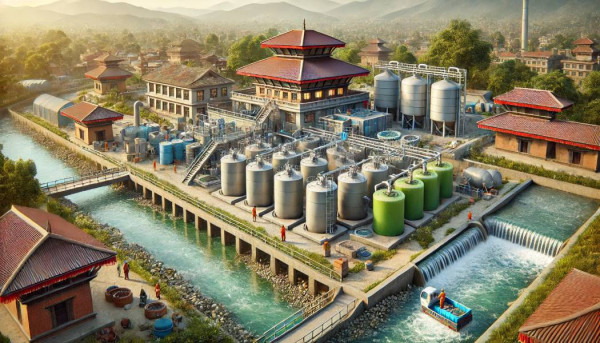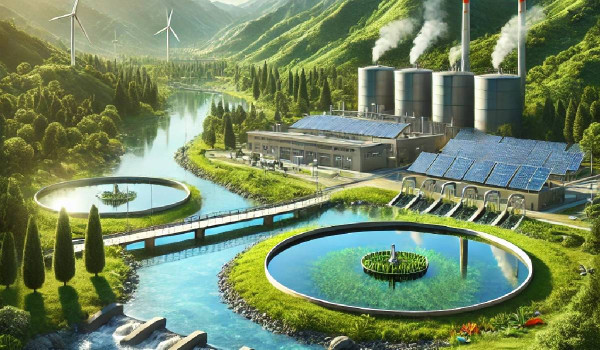News & Blogs
-1742900752.jpg)
Nepal, a country celebrated for its natural beauty and rich cultural heritage, faces a growing environmental challenge: untreated wastewater. With rapid urbanization, population growth, and industrial expansion, the strain on water resources has intensified. Polluted rivers, contaminated groundwater, and health risks underscore the urgent need for effective wastewater treatment solutions. Implementing sustainable wastewater management practices is essential for ensuring a cleaner and healthier future.
The Current State of Wastewater in Nepal
Nepal’s wastewater crisis is stark:
- Over 90% of urban wastewater is discharged untreated into rivers and land (UN-Habitat).
- Rivers like the Bagmati and Bishnumati are heavily polluted, threatening biodiversity and public health.
- Rural areas lack basic sanitation infrastructure, leading to groundwater contamination.
The consequences of inadequate wastewater treatment include:
- Increased waterborne diseases.
- Reduced agricultural productivity due to water contamination.
- Degraded ecosystems and loss of aquatic life.
Addressing these challenges requires a blend of modern technology, community-driven initiatives, and policy reform to establish a sustainable wastewater management system in Nepal.
Sustainable Wastewater Treatment Solutions for Nepal
Here are five innovative approaches transforming wastewater management in Nepal:
1. Decentralized Wastewater Treatment Systems (DEWATS)
Centralized sewage systems are costly and impractical for Nepal’s rugged terrain. Decentralized wastewater treatment plants (DEWATS) offer a scalable alternative. These systems treat water locally using natural processes such as anaerobic digestion and constructed wetlands. For example, the Khumaltar DEWATS project in Lalitpur treats household sewage, producing reusable water for irrigation.
2. Constructed Wetlands for Natural Filtration
Mimicking natural ecosystems, constructed wetlands filter pollutants through plants, soil, and microorganisms. Nepal’s Dhulikhel Municipality has successfully implemented wetlands to treat municipal wastewater, improving water quality while creating green spaces. These systems require low maintenance and provide long-term sustainability.
3. Biogas from Wastewater
Integrating biogas plants with wastewater treatment turns organic waste into energy. The Biogas Sector Partnership Nepal promotes systems where household sewage feeds biogas digesters, producing clean fuel and reducing sludge. This approach not only treats wastewater but also contributes to Nepal’s renewable energy goals.
4. Community-Led Sanitation Programs
Grassroots initiatives like Community-Led Total Sanitation (CLTS) empower villages to build toilets and manage waste sustainably. The UNICEF-supported program in rural Nepal has drastically reduced open defecation, protecting water sources from contamination. Engaging communities in sanitation practices ensures long-term success.
5. Policy and Technology Partnerships
Collaborations between the government, NGOs, and tech firms are critical for improving wastewater treatment. The National Urban Water Supply and Sanitation Policy prioritizes wastewater treatment, while partnerships with organizations like WaterAid introduce cutting-edge filtration technologies. Stricter regulations and enforcement will enhance wastewater management efforts.
Case Study: Reviving the Bagmati River
The Bagmati River Cleanup Campaign, a citizen-led movement, has become a symbol of hope. Weekly cleanups, combined with new treatment plants along the riverbank, have reduced pollution levels by 40% in targeted areas. This proves that collective action and sustainable wastewater infrastructure can revive ecosystems.
The Road Ahead: Challenges and Opportunities
While progress is promising, challenges remain:
- Funding gaps for large-scale projects.
- Limited public awareness about wastewater reuse.
- Coordination issues among stakeholders.
However, there are significant opportunities:
- Leveraging solar-powered treatment systems for remote areas.
- Promoting circular economy models, such as using treated water for agriculture.
- Expanding public-private partnerships to scale wastewater treatment solutions.
Nepal’s wastewater treatment challenges require immediate and strategic action. By adopting decentralized systems, constructed wetlands, biogas technology, and community-driven programs, the country can improve wastewater management while protecting its natural resources. Increased investment in infrastructure, policy enforcement, and public awareness will be essential for creating a sustainable future.
At CivilTech Nepal, we specialize in designing and implementing wastewater treatment solutions tailored to Nepal’s unique environmental challenges. Contact us today to learn how we can help transform wastewater into a resource for sustainable development.



